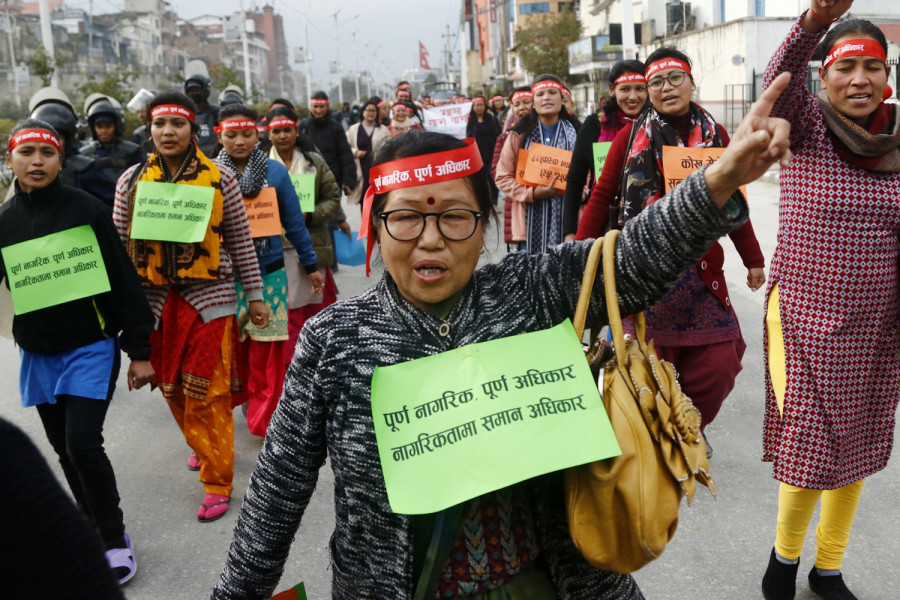National
UN rapporteurs concerned over proposed citizenship law
Some provisions seem discriminatory against women, and sexual minorities, they say.
Anil Giri
Two UN rapporteurs and one independent expert on protection against violence and discrimination based on sexual orientation, gender identity and discrimination against women and child have expressed serious concern over some of the provisions proposed in the citizenship bill currently being debated in Parliament.
Writing an eight-page letter to the government of Nepal through Nepal’s Permanent Mission in Geneva on September 21, whose copy the Post has obtained, the three UN-appointed experts have expressed their reservations over some of the discriminatory provisions proposed in the bill.
The three experts say that the proposed law seemed to be discriminatory against women, trans and gender-diverse persons, and does not comply with international human rights norms and standards.
Bharatraj Poudyal, spokesperson for the Ministry of Foreign Affairs, told the Post that a reply would be sent after consultations with the stakeholders.
Civil society organisations and international human rights bodies have consistently highlighted that both the citizenship amendment bill and the Constitution of Nepal contain provisions that discriminate against women with regard to nationality and the ability to transmit citizenship through marriage and to their children.
On August 7, 2018, a bill to amend the Citizenship Act was registered in the House of Representatives. On 21 June 2020, the parliamentary Committee on State Affairs and Good Governance passed the bill with amendments and presented it to the House for deliberation. The bill is expected to be discussed in the winter session of Parliament.
“While we acknowledge that the current bill, if approved, could have significant impact in increasing access to citizenship in Nepal and reducing the number of people who are currently stateless in the country, we express our concern about the persistence of discriminatory provisions affecting women and their children, as well as trans and gender-diverse persons”, the UN experts state in the letter addressed to the government.
Such provisions may continue to severely impact the enjoyment of their human rights, including a broad range of their civil, political, economic, social and cultural rights, they added.
The UN rapporteurs and experts also drew the attention of government of Nepal to consider various international conventions that Nepal is a party to such as the United Nations Convention on the Elimination of all Forms of Discrimination against Women (CEDAW Convention), Convention on the Rights of the Child (CRC), International Covenant on Civil and Political Rights (ICCPR) and Convention on the Elimination of All Forms of Racial Discrimination (CERD).
A senior official at the Prime Minister’s Office told the Post that the letter was written based on the rumours spread by some non-government organisations and human rights organisations and that it has a lot of factual errors.
During a recent event in New York, some participants had raised questions about discriminatory provisions in the proposed citizenship law where Nepal’s ambassador Amrit Kumar Rai had clarified the concerns raised by some activities already, the official said.
As Nepal is looking for a second term as a member of the UN human rights council and elections are due to take place in October, the international community has been voicing concerns over Nepal’s human rights record, state of the transitional justice process, and other constitutional and legal provisions.
The letter contains issues like access to citizenship by orphans, protection against caste-based discrimination, provisions regarding women’s ability to access and transmit citizenship and gender identity in citizenship document.
“The lack of legal identity, which affects approximately 6.3 million people in Nepal, severely impacts access to rights and services, and is particularly prejudicial in the context of the Covid-19 pandemic, as it may restrict individual’s ability to access relief aid and to engage in efforts to build back better,” the letter stated. “In that sense, addressing the legal gaps that currently place millions of individuals in a situation of statelessness becomes an even more urgent task.”
Another senior government official who is experienced in dealing with international legal matters said Nepal has always welcomed and given access to the UN rapporteurs and has replied to their letters or any other findings sent by the UN bodies in the past.
“We looked through the letter and will reply to the letter meticulously and in detailed consultation with all relevant stakeholders,” the official said.
Two of these government officials agree that as elections to the UN human rights council is approaching fast, some members of the international community want to build pressure on Nepal and extract more commitments.
Nepal is seeking yet another term on the Human Rights Council for the 2021-23 period, amid rising concerns over the country’s commitment to rights issues and criticism for failing to keep its past promises, including those which it made before its election to the UN body for the 2018-20 period.
“Therefore, we call upon the Nepal government to address the bill’s shortcomings during the upcoming discussion of the bill in the House of Representatives, by promoting further amendments to it in order to eliminate discriminatory provisions and to reduce unnecessary burdens of proof, in accordance with relevant international human rights standards and the recommendations issued to Nepal by the Special Rapporteur on violence against women, the CEDAW Committee, the Committee on the Rights of the Child and by the members of the Human Rights Council during its last Universal Periodic Review,” the experts wrote, while urging the government of Nepal to initiate the process to amend the constitution and other pieces of legislation that affect access to citizenship, to ensure that all discriminatory provisions are eliminated before passing into the law.




 13.12°C Kathmandu
13.12°C Kathmandu














